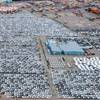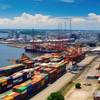Brazilian Grain Trucker Blockade Continues, Threatens Harvest
Truckers protesting high diesel prices in Brazil used road blocks to restrict the flow of soy, corn and other commodities in a key grain-growing region for a third day on Friday, threatening what is expected to be a record harvest.
A group of transport companies and independent truckers are blocking the flow of goods on the main highway and other major roads in Mato Grosso, a center-west state that is Brazil's top producer of soybeans and a major source of corn and livestock.
"Everything is stopped," a silo manager at a multinational grain trader in the state said on condition of anonymity. "In three to four days, it will be a problem for industry and the ports."
He said trucks were allowed to go to local silos to unload but not to crushers or ports.
The protest began on Wednesday as truckers parked on the shoulders of highway BR 163 in two of the state's towns but quickly spread to include the towns of Nova Mutum, Lucas do Rio Verde, Sorriso and Sinop, said Rota do Oeste, the road operator for the highway in Mato Grosso.
Until Friday, truckers had limited the flow of goods only from 8 a.m. local time (1000 GMT) to 11 a.m. and from 1 p.m. to 7 p.m. Truckers, however, have escalated their protest and vowed to continue the blockade until the state government demonstrates a willingness to reduce the diesel taxes.
"It is now for an indefinite period," said Gilson Pelicioni, a protest leader who owns a trucking company and is a councilman in Lucas do Rio Verde.
Truckers and transport companies are scheduled to talk with officials of the state government later on Friday.
Meanwhile, Rota do Oeste reported that lines of trucks are forming on the sides of the roads affected by the blockade. Truckers are allowing cars, public transport and other non-commodity-related vehicles to travel without obstruction.
Brazil's grain producers association, Aprosoja, said late on Thursday that the truckers' demands were valid but stressed the importance of a functioning transport infrastructure during the peak of a record grain harvest.
"We need farms to be supplied with diesel (to fuel harvesters) and transport of soybeans to silos to be guaranteed," Aprosoja President Ricardo Tomczyk said in a note.
By Gustavo Bonato













